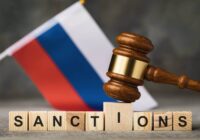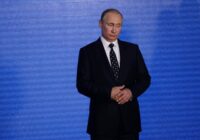Weaknesses and inconsistencies in Turkish strategy leave it exposed to Russian objectives in the Syrian civil conflict.
In November 2015, a Turkish F16 fighter jet shot down a Russian Sukhoi Su-24M on the Syrian-Turkish border, sparking a diplomatic row that resulted in painful Russian sanctions against Ankara. Two recent incidents in the Syrian War illustrate not only how international that conflict has become, but also how opaque and surreal it is.
First, a Russian-made missile was blamed for the destruction of a Turkish tank and the killing of eight soldiers in the single largest loss of Turkish lives in the Afrin offensive to date. On the same day, a Russian fighter jet was shot down in Idlib province. All the evidence suggests that the Syrian rebels who did so have strong links to Turkey.
What is termed the Syrian Civil War is now a convoluted set of interrelated conflicts occurring in the geographical space internationally recognized as Syria. The contortions now being performed by some of the outside actors in these conflicts can only magnify for the Syrian forces involved their plight as pawns in much bigger strategic games.
The responses to the latest incidents highlight the importance placed upon Russian-Turkish relations in the context of the conflict. Both sides wish to maintain an engaged stance with each other. Not only was there no Turkish reaction to the suggestion of Russian materiel being responsible for Turkish deaths, but the Russians responded to the downing of their jet by Turkish allies by asking the Turks for assistance in the repatriation of the pilot’s body.
Russia has since asked for Turkey’s further cooperation in recovering the jet and establishing what sort of device was used to down it. This strangely gentlemanly behavior among large powers on different sides of the Syrian conflict calls the entire war itself into question. How long can conflict be sustained if the opposing international backers are inching closer and closer together?
Asymmetric alliance
This question highlights a recurring issue at the heart of Turkish foreign policy since the Arab Uprisings, not only with relation to Russia, but the United States as well. For all President Recep Tayyip Erdogan’s posturing for his domestic audience, the hard truth is that Turkey is a junior partner whenever it steps to the negotiating table with either major power.
The stark difference between Russian-Turkish relations today, and relations in 2015 following the Turkish downing of a Russian bomber, is the result not of rapprochement so much as the weakness of the Turkish position. As has been witnessed since the beginning of the Syrian conflict, Russia’s position remains virtually static. It backs President Bashar al-Assad’s forces. All other actors are illegitimate. Most are active targets under the catchall of “terrorists.”
Turkey has always been the most hawkish among the nations that lined up behind the US in support of the rebel uprising. It has maintained that Assad must go in order for any political settlement to take place. It has actively backed rebel groups, and its forces are now fighting on Syrian soil for territory. As they do so, they get closer and closer to Russian forces.
Yet they do so with Russian largesse, and it is clear that such largesse has its limits. Russia controls the airspace and appears reluctant to give Turkey a free rein in the Kurdish enclave of Afrin. Yet Turkey is useful to Russia. It has control over portions of the Syrian rebels. It is also a major country within the NATO alliance, offering an opportunity for disruption that is a key strategic goal of the Vladimir Putin regime.
 By bringing Turkey into the peace talks it has conducted with Iran, Russia plays at presenting Turkey as a powerbroker with a place at the top table. It buys the talks credibility whilst simultaneously undermining and isolating the US. It also pushes Turkey into the same corner the United States had previously been pushed into — that of feeling the pressure to accept Assad as a fact on the ground.
By bringing Turkey into the peace talks it has conducted with Iran, Russia plays at presenting Turkey as a powerbroker with a place at the top table. It buys the talks credibility whilst simultaneously undermining and isolating the US. It also pushes Turkey into the same corner the United States had previously been pushed into — that of feeling the pressure to accept Assad as a fact on the ground.
Setting the agenda
Turkey is not the United States. It has fewer resources at its disposal with which to resist Russian power. With the Turkish Deputy Prime Minister Mehmet Simsek emphasizing on February 9 the Turkish desire for a “unified, stable Syria” above all else, it appears that the diplomatic trajectory is on a collision course with Turkish goals in Syria. The insistence on the removal of President Assad has softened as the conflict has drawn on. Others concessions may soon follow.
Turkey seems close to the point where it might theoretically accept Assad’s forces, with the backing of Russian airpower and Iranian militias, overrunning the Kurdish YPG militias all the way to the Turkish frontier. There is, however, one problem: The role of spoiler — so often the preserve of the Russians — is now being played in Syria by the United States.
While many predicted that US support for the Syrian Kurds would evaporate with the defeat of the Islamic State, it seems that the Trump administration sees the Syrian Kurds as the best way of maintaining leverage within the Syrian state. The attempt to form a US-trained border force made up ostensibly of Syrian Kurdish YPG militiamen is a case in point.
The result is that Turkey has been forced across the border into Syria, in pursuit of its own strategic objectives. Yet this move has brought it directly into conflict with Russia, an external player with a far stronger hand in Syria, and one that has recently faced down the Turks in the diplomatic row that followed the 2015 downing of the Russian fighter jet. Turkey is loath to isolate itself from Russia again. The result is an awkward dance in Syria that is likely to get a lot more difficult.
The views expressed in this article are the author’s own and do not necessarily reflect Fair Observer’s editorial policy.
Photo Credit: kafeinkolik / Shutterstock.com
Support Fair Observer
We rely on your support for our independence, diversity and quality.
For more than 10 years, Fair Observer has been free, fair and independent. No billionaire owns us, no advertisers control us. We are a reader-supported nonprofit. Unlike many other publications, we keep our content free for readers regardless of where they live or whether they can afford to pay. We have no paywalls and no ads.
In the post-truth era of fake news, echo chambers and filter bubbles, we publish a plurality of perspectives from around the world. Anyone can publish with us, but everyone goes through a rigorous editorial process. So, you get fact-checked, well-reasoned content instead of noise.
We publish 2,500+ voices from 90+ countries. We also conduct education and training programs
on subjects ranging from digital media and journalism to writing and critical thinking. This
doesn’t come cheap. Servers, editors, trainers and web developers cost
money.
Please consider supporting us on a regular basis as a recurring donor or a
sustaining member.
Will you support FO’s journalism?
We rely on your support for our independence, diversity and quality.






